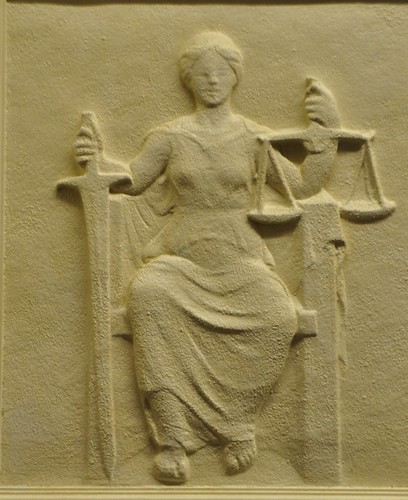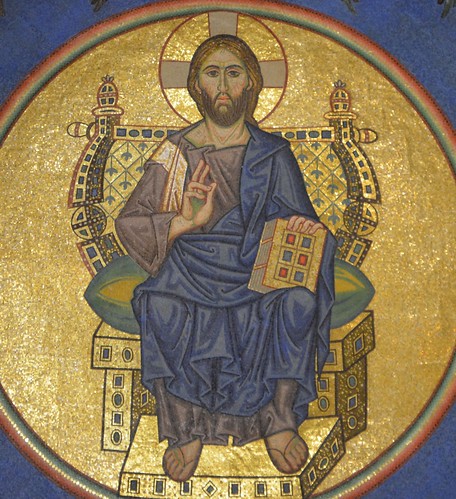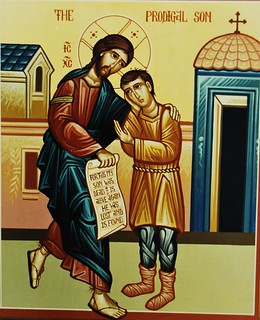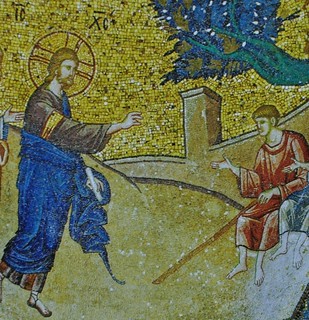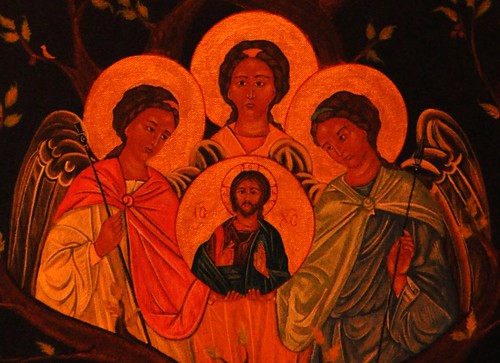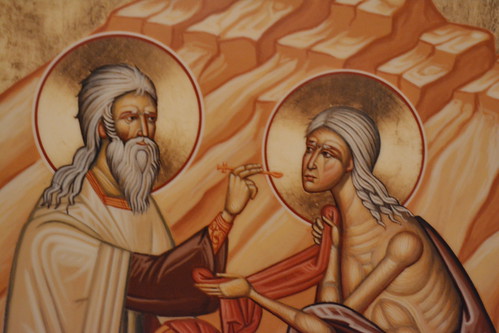This is the 5th post in this blog series meditating on Psalm 51. The previous post is David the Image of Repentance.

The 51st Psalm presents us with a particular vision of repentance which I believe is reflected in the Liturgy of the Orthodox Church. This understanding of repentance does not demand that we think of ourselves as vile, worthless worms wallowing in the mire. Nor does it envision us as being angels in the flesh. Rather it views us as being human – created in God’s image and likeness, created to have dominion over creation, created to be united to divinity and share in the divine love and life. We are created to be the temple in which God dwells on earth. Yet, we also have free will which means we are not automatons who are programmed to do what God wants. Rather, we have to choose to do God’s will if we want. We are conscious beings who can realize our willful disobedience to God as well as our mistakes.
Psalm 51 as a prayer of repentance shows us to acknowledge our sins and errors, to “man up” as it were and own our behavior, admitting to God when we are wrong. We have the example in Adam and Eve of what not to do when we sin (Genesis 3). For they failed to admit to their wrong doing and tried to place blame outside of themselves. King David, on the other hand, shows himself to be every bit the sinner that Adam was, yet he places himself before God, the merciful judge, and trusts himself to whatever God decides. David does not despair, deny God or his sinfulness, engage in self-pity, think everything is inconsequential, become nihilistic, or spiral out of control. Instead, David despite his personal failings continues to recognize the Lordship of God. David sees his own behavior as of  limited value and consequence, still occurring within the confines of God’s universe. So though he is God’s chosen king, he recognizes his choices are not always right and he still has to answer to the Lord. Repentance consists of understanding this right relationship with God, with creation and the rest of humanity. Repentance is a course correction, right-sizing, recalculation, re-evaluation, self-examination in which one recognizefs God’s rightful lordship and one’s own servant role even if one is emperor. In praying Psalm 51, we are recognizing our need for God to be God and to do everything in our life that we need God to do for us to be rightfully human.
limited value and consequence, still occurring within the confines of God’s universe. So though he is God’s chosen king, he recognizes his choices are not always right and he still has to answer to the Lord. Repentance consists of understanding this right relationship with God, with creation and the rest of humanity. Repentance is a course correction, right-sizing, recalculation, re-evaluation, self-examination in which one recognizefs God’s rightful lordship and one’s own servant role even if one is emperor. In praying Psalm 51, we are recognizing our need for God to be God and to do everything in our life that we need God to do for us to be rightfully human.
There is another prayer of repentance in Orthodoxy that is similar in content and structure to Psalm 51 which can be found in many Orthodox prayer books and in the compline service. It is a prayer of repentance of the King of Judah Manasseh mentioned in 2 Chronicles 33 which describes an incident in the 7th Century BC. “During his distress, Manasseh made peace with the Lord his God, truly submitting himself to the God of his ancestors. He prayed, and God was moved by his request. God listened to Manasseh’s prayer and restored him to his rule in Jerusalem. Then Manasseh knew that the Lord was the true God” (vs 12-13). As with King David’s sin and Psalm 51, repentance for Manasseh yields a restored and right relationship with God. The focus is not on Manasseh’s remorse and regret but on his submitting to the Lordship of God. However, scholars think the prayer itself comes from the 2nd Century BC since it is not found in the ancient Jewish texts. The prayer begins:
Lord Almighty, God of our ancestors, God of Abraham, Isaac, Jacob, and their righteous children, you made heaven and earth with all their beauty. You set limits for the sea by speaking your command. You closed the bottomless pit, and sealed it by your powerful and glorious name. All things fear you and tremble in your presence, because no one can endure the brightness of your glory. No one can resist the fury of your threat against sinners. But your promised mercies are beyond measure and imagination, because you are the highest, Lord, kind, patient, and merciful, and you feel sorry over human troubles. You, Lord, according to your gentle grace, promised forgiveness to those who are sorry for their sins. In your great mercy, you allowed sinners to turn from their sins and find salvation.

As with many Orthodox liturgical prayers, the opening of Manasseh’s prayer speaks only of God and all that God has done or is doing. The purpose of this opening is to establish the Lordship of God – it tells us to whom we are praying and why we recognize this God as our Lord. Then the prayer continues:
Therefore, Lord, God of those who do what is right, you didn’t offer Abraham, Isaac, and Jacob, who didn’t sin against you, a chance to change their hearts and lives. But you offer me, the sinner, the chance to change my heart and life, because my sins outnumbered the grains of sand by the sea. My sins are many, Lord; they are many. I am not worthy to look up, to gaze into heaven because of my many sins. Now, Lord, I suffer justly. I deserve the troubles I encounter. Already I’m caught in a trap. I’m held down by iron chains so that I can’t lift up my head because of my sins. There’s no relief for me, because I made you angry, doing wrong in front of your face, setting up false gods and committing offenses.
Manasseh’s prayer, more than Psalm 51, accepts the notion that “I” being a sinner am unworthy of my title of being human. It acknowledges that sin is very powerful in this world, and that “I” have not resisted its power. This prayer more openly accepts that since God is the Lord, “I” deserve judgment and all that is happening around me is related to or effected by my sin. Whereas Psalm 51 only speaks of the mercy of God, Manasseh sees God’s anger and accepts it as a just reaction to his behavior.

Now I bow down before you from deep within my heart, begging for your kindness. I have sinned, Lord, I have sinned, and I know the laws I’ve broken.
I’m praying, begging you:
Forgive me, Lord, forgive me. Don’t destroy me along with my sins. Don’t keep my bad deeds in your memory forever. Don’t sentence me to the earth’s depths, for you, Lord, are the God of those who turn from their sins. In me you’ll show how kind you are. Although I’m not worthy, you’ll save me according to your great mercy. I will praise you continuously all the days of my life, because all of heaven’s forces praise you, and the glory is yours forever and always. Amen.

The conclusion of Manasseh’s prayer is more in line with Psalm 51, though expressing things more in the negative. Manasseh tells God what he needs God to do: forgive me, don’t destroy me (but do destroy my sins!), don’t remember my sins forever, don’t condemn me. Manasseh has hope that God will show kindness and save him. His response, like David’s, will be to praise God. Repentance leads to praise not just to self-denigration. If one repents one spends the remaining time of one’s life giving glory and praise to God. Repentance leads us to the Liturgy where we give thanks to God and praise God for all the blessings God’s bestows upon us. This is true repentance – not remorse and regret, but thanksgiving and praise of God.
St. Maximos the Confessor expresses this same truth:
 “Every genuine confession humbles the soul. When it takes the form of thanksgiving, it teaches the soul that it has been delivered by the grace of God. When it takes the form of self-accusation, it teaches the soul that it is guilty of crimes through its own deliberate indolence. Confession takes two forms. According to the one, we give thanks for blessings received; according to the other, we bring to light and examine what we have done wrong. We use the term confession both for the grateful appreciation of the blessings we have received through divine favor, and for the admission of the evil actions of which we are guilty. Both forms produce humility. For he who thanks God for blessings and he who examines himself for his offences are both humbled. The first judges himself unworthy of what he has been given; the second implores forgiveness for his sins.” (THE PHILOKALIA, Kindle Loc. 18272-80)
“Every genuine confession humbles the soul. When it takes the form of thanksgiving, it teaches the soul that it has been delivered by the grace of God. When it takes the form of self-accusation, it teaches the soul that it is guilty of crimes through its own deliberate indolence. Confession takes two forms. According to the one, we give thanks for blessings received; according to the other, we bring to light and examine what we have done wrong. We use the term confession both for the grateful appreciation of the blessings we have received through divine favor, and for the admission of the evil actions of which we are guilty. Both forms produce humility. For he who thanks God for blessings and he who examines himself for his offences are both humbled. The first judges himself unworthy of what he has been given; the second implores forgiveness for his sins.” (THE PHILOKALIA, Kindle Loc. 18272-80)
Next: What does God Ask of Us?












